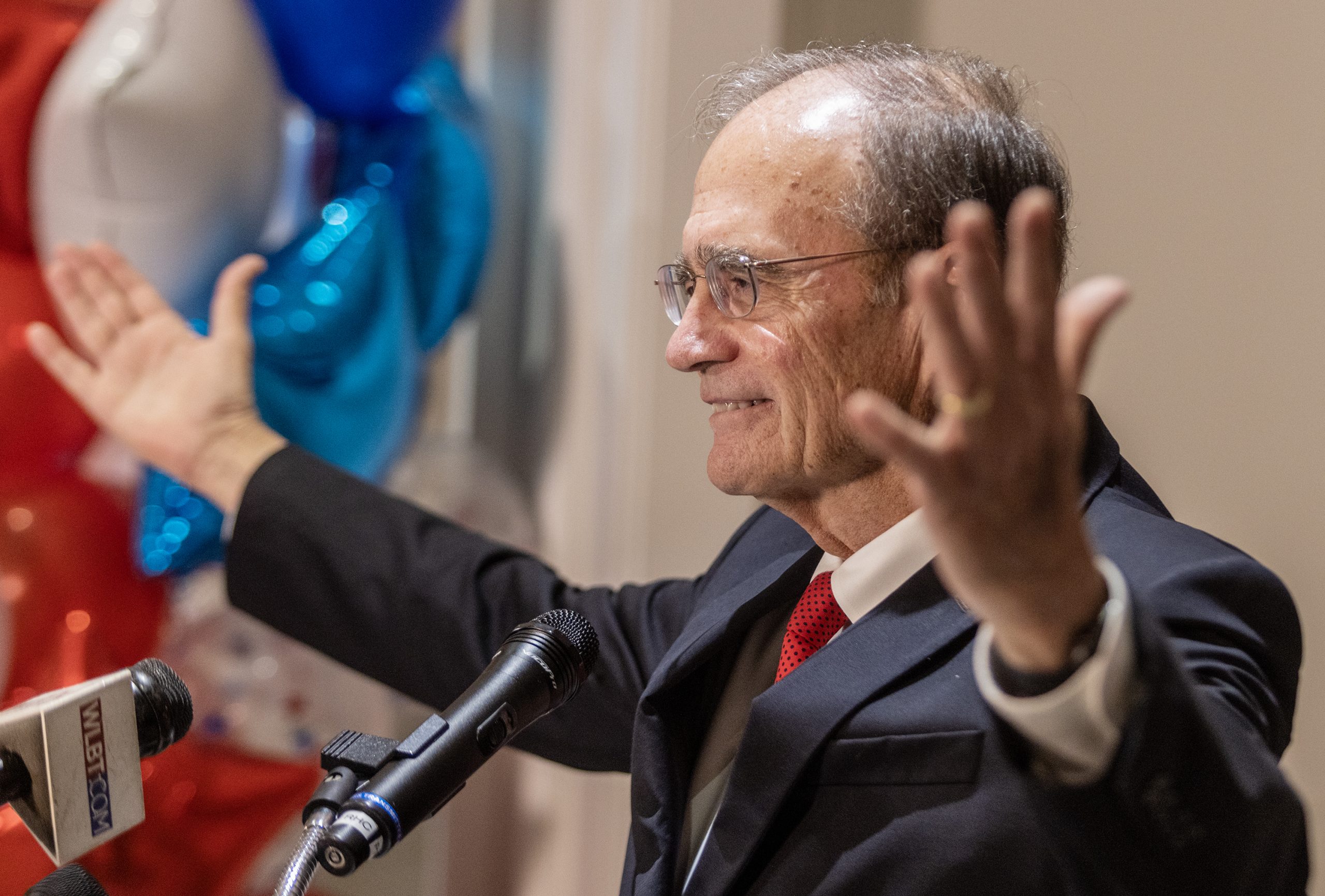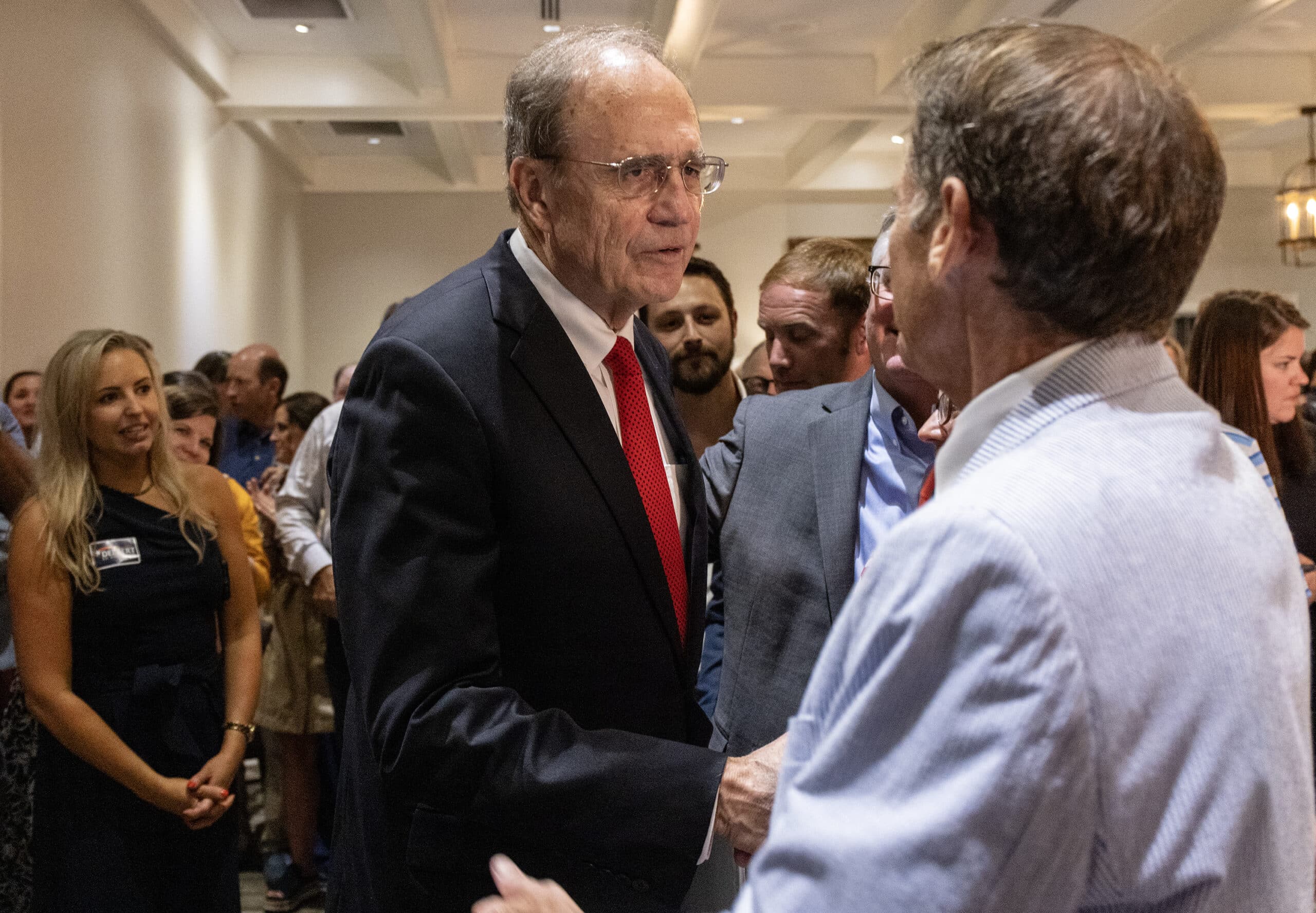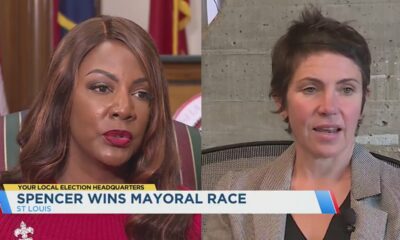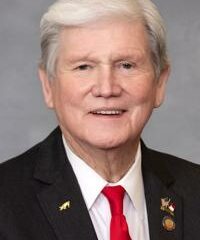Mississippi Today
Republican Lt. Gov. Delbert Hosemann defeats Chris McDaniel, will face Democratic newcomer in November

Incumbent Republican Lt. Gov. Delbert Hosemann defeated state Sen. Chris McDaniel and another Republican challenger in Tuesday’s GOP primary.
Now facing only a little-known political newcomer in November’s general election, Hosemann in his victory speech late Tuesday night recounted numerous accomplishments and was looking forward to four more years running the state Senate.
“We want to build a state where our children and grandchildren want to stay and live,” Hosemann said. “… We are in in the best financial shape we’ve ever been in the state’s history. We are going to tackle so many of our state’s issues and we are going to solve so many of our state’s problems.”
Hosemann said he was trying to “temper” remarks about his opponent McDaniel and what became a nasty race in the homestretch. He also vowed to push for serious campaign finance reform, after he filed several claims McDaniel and related PACs violated state laws.
“When you have this much dark money pumped into a race — almost $1 million in the last week — it screams for reform,” Hosemann said. He also chided social media trolls who leveled attacks against him and supporters in recent weeks.
“Some of these people on social media, they spew venom at people they don’t even know,” Hosemann said. “When you wake up and look at yourself in the mirror, what have you done positive for Mississippi? I think the answer is nothing.”
Hosemann, 76, earned about 52% of the Republican primary vote on Tuesday, avoiding a runoff with McDaniel and assuring his spot on the November general election ballot. McDaniel received about 43% of the vote, and lesser-known candidate Tiffany Longino garnered about 5%.
Hosemann in November will face Democrat Ryan Grover, a political newcomer who ran unopposed in his party primary on Tuesday.
READ MORE: What incumbent Lt. Gov. Delbert Hosemann wants to do for Mississippi
McDaniel, who in 2014 refused to concede after losing to former U.S. Sen. Thad Cochran in the Republican primary, conceded late Tuesday night at an election night party in Biloxi.
“While the road to get here has been tough, I am forever grateful for the hard work of my grassroots supports who built this campaign from the ground up,” McDaniel said. “Tonight, it’s clear Delbert Hosemann heard you, and I know grassroots patriots will continue to encourage him to fight for Mississippi values and our conservatives principles.”
The four-term state senator also acknowledged to Mississippi Today that a lack of campaign dollars likely played a significant role in his Tuesday night loss, given Hosemann spent significantly more money on the race.
“Unfortunately, the money remains a difficult impediment,” McDaniel said. “We all know the rules. Whoever raises the most money has the best chance of winning.”

Hosemann, as a well-known Republican incumbent who had served two terms as secretary of state, by most accounts wasn’t expecting such a hard contest for reelection. But McDaniel, who has developed a loyal base of largely the malcontented far-right, started his campaign against “Delbert the Democrat” more than a year ago and appeared to be gaining ground. McDaniel has used this tactic in his previous unsuccessful runs for higher office — claiming he’s a real conservative and the Republicans he’s attempting to oust are not.
As with his past bids for higher office, McDaniel supporters launched mud slinging and trolling social media attacks against Hosemann and his supporters, including a faked endorsement of Hosemann by Black Lives Matter aimed at turning off white voters in north Mississippi. McDaniel, as he has done in the past, denied complicity in such attacks.
It didn’t help that Hosemann didn’t receive support from his fellow Republican Gov. Tate Reeves, with whom he’s often clashed over policy. Reeves at one point in the primary campaign season appeared to give a tacit endorsement of McDaniel. Should Reeves be reelected governor, this portends more clashes down the road as he tries to get a Hosemann-led Senate to help enact his policy proposals.
Hosemann countered by pointing to McDaniel’s ineffectual record over his four terms as a state senator. McDaniel, although a firebrand when giving a political stump speech, has long been known by fellow senators for his frequent absences from Senate proceedings and lack of work when it comes to legislating. He’s also usually clashed with Senate leadership and his fellow Republicans, and since 2014 has authored only three bills that passed into law: one recognizing a football team, another congratulating a pageant winner and another declaring a West Nile prevention week.
McDaniel’s previous unsuccessful statewide campaigns have been marred by his supporters’ dirty tricks — which at times required law enforcement to get involved and resulted in felony convictions and a jail sentence for one.
McDaniel for this campaign struggled to raise campaign money from people and businesses inside Mississippi, but he managed to get substantial help primarily from D.C. Beltway, secretly sourced dark money funneled through PACs. All told, about $1.4 million in out-of-state dark money was pumped into McDaniel’s campaign, a PAC he created and another than ran ads attacking Hosemann — a notable record for a down-ticket Mississippi state office race.
READ MORE: Out of state PACs dump dark money into McDaniel’s lieutenant governor’s race
From the start, Hosemann accused McDaniel of major campaign finance law violations and filed complaints with Attorney General Lynn Fitch’s office. Fitch for months appeared to ignore these complaints, but just days before Tuesday’s primary, she announced her office was investigating a state PAC created by McDaniel’s campaign treasurer and some of the complaints Hosemann raised.
READ MORE: Fitch says she’s investigating PAC run by Chris McDaniel treasurer
The race highlighted Mississippi’s weak campaign finance laws and nearly nonexistent enforcement and brought calls for reform, including from Hosemann and Republican Secretary of State Michael Watson.
READ MORE: Chris McDaniel, Lynn Fitch show that Mississippi might as well not have campaign finance laws
This article first appeared on Mississippi Today and is republished here under a Creative Commons license.
Mississippi Today
On this day in 1947, Jackie Robinson broke MLB color barrier
April 15, 1947

Jackie Robinson broke through the color barrier in Major League Baseball, becoming the first Black player in the 20th century.
Born in Cairo, Georgia, Robinson lettered in four sports at UCLA – football, basketball, baseball and track. After time in the military, he played for the Kansas City Monarchs in the Negro Leagues. After his success there, Dodgers general manager Branch Rickey signed Robinson, and the legendary baseball player started for Montreal, where he integrated the International League.
In addition to his Hall of Fame career, he was active in the civil rights movement and became the first Black TV analyst in Major League Baseball and the first Black vice president of a major American corporation.
In recognition of his achievements, Robinson was posthumously awarded the Presidential Medal of Freedom and the Congressional Gold Medal.
Major League Baseball retired his number “42,” which became the title of the movie about his breakthrough.
Ken Burns’ four-hour documentary reveals that Robinson did more than just break the color barrier — he became a leader for equal rights for all Americans.
This article first appeared on Mississippi Today and is republished here under a Creative Commons Attribution-NoDerivatives 4.0 International License.![]()
Mississippi Today
Mississippians highlight Black Maternal Health Week
Advocates and health care leaders joined lawmakers Monday morning at the Capitol to recognize Black Maternal Health Week, which started Friday.
The group was highlighting the racial disparities that persist in the delivery room, with Black women three times more likely to die of a pregnancy-related cause than white women.
“The bond between a mother and her baby is worth protecting,” said Cassandra Welchlin, executive director of the Mississippi Black Women’s Roundtable.
Rep. Timaka James-Jones, D-Belzoni, spoke about her niece Harmony, who suffered from preeclampsia and died on the side of the road in 2021 along with her unborn baby, three miles from the closest hospital in Yazoo City.
“It’s utterly important that stories are shared – but realize these are not just stories. This is real life,” she said.
The tragedy inspired James-Jones to become a lawmaker. She says she is working on gaining support to appropriate the funds needed to build a standalone emergency room in Belzoni.
But it isn’t just emergency medical care that’s lacking for some mothers. Mental health conditions are a leading cause of pregnancy-related deaths, defined as deaths up to one year postpartum from associated causes.
And more than 80% of pregnancy-related deaths are deemed preventable – making the issue ripe for policy change, advocates said.
“About 20 years ago, I was almost a statistic,” said Lauren Jones, a mother who founded Mom.Me, a nonprofit seeking to normalize the struggles of motherhood through community support. “I contemplated taking my life, I severely suffered from postpartum depression … None of my physicians told me that the head is connected to the body while pregnant.”
With studies showing “mounting disparities” in women’s health across the United States – and Mississippi scoring among the worst overall – more action is needed to halt and reverse the inequities, those at the press conference said.
The Mississippi Legislature passed four bills related to maternal health between 2018 and 2023, according to a study by researchers at the University of Mississippi Medical Center.
“How many times are we going to have to come before committees like this to share the statistics before the statistics become a solution?” Jones asked.
A bill that would require health care providers to offer postpartum depression screenings to mothers is pending approval from the governor.
Rep. Zakiya Summers, D-Jackson, the organizer of the press conference, commended the Legislature for passing presumptive eligibility for pregnant women this year. The policy will allow women to receive health care covered by Medicaid as soon as they find out they are pregnant – even if their Medicaid application is still pending. It was spearheaded by Rep. Missy McGee, R-Hattiesburg.
Summers also thanked Rep. Kevin Felsher, R-Biloxi, for pushing paid parental leave for state employees through the finish line this year.
Speakers emphasized the importance of focusing Black Maternal Health Week not just on mitigating deaths but on celebrating one of life’s most vulnerable and meaningful events.
“Black Maternal Health Week is a celebration of life, since Black women don’t often get those opportunities to celebrate,” said Nakeitra Burse, executive director of Six Dimensions, a minority women-owned public health research agency. “We go into our labor and delivery and pregnancy with fear – of the unknown, fear of how we’ll be taken care of, and just overall uncertainty about the outcomes.”
This article first appeared on Mississippi Today and is republished here under a Creative Commons Attribution-NoDerivatives 4.0 International License.![]()
Mississippi Today
Trump to appoint two Northern District MS judges after Aycock takes senior status
President Donald Trump can now appoint two new judges to the federal bench in the Northern District of Mississippi.
U.S. District Judge Sharion Aycock announced recently that she was taking senior status effective April 15. This means she will still hear cases as a judge but will have a reduced caseload.
“I have been so fortunate during my entire legal career,” Aycock said in a statement. “As one of only a few women graduating in my law school class, I had the chance to break ground for the female practitioner.”
A native of Itawamba County, Aycock graduated from Tremont High School and Mississippi State University. She received her law degree from Mississippi College, where she graduated second in her class.
Throughout her legal career, she blazed many trails for women practicing law and female jurists. She began her career as a judge when she was elected as a Mississippi Circuit Court judge in northeast Mississippi in 2002, the first woman ever elected to that judicial district.
She held that position until President George W. Bush in 2007 appointed her to the federal bench. After the U.S. Senate unanimously confirmed her, she became the first woman confirmed to the federal judiciary in Mississippi.
This makes Aycock the second judge to take senior status in four years. U.S. District Judge Michael Mills announced in 2021 that he was taking senior status, but the U.S. Senate still has not confirmed someone to replace him.
President Joe Biden appointed state prosecutor Scott Colom to fill Mills’ vacancy in 2023. U.S. Sen. Roger Wicker approved Colom’s appointment, but U.S. Sen. Cindy Hyde-Smith blocked his confirmation through a practice known as “blue slips,” where senators can block the confirmation of judicial appointees in their home state.
This means President Trump will now have the opportunity to appoint two federal judges to lifetime appointments to the Northern District. U.S. District Judge Debra Brown will soon be the only active federal judge serving in the district. Aycock, Mills, and U.S. District Judge Glen Davidson will all be senior-status judges.
Federal district judges provide crucial work to the federal courts through presiding over major criminal and civil trials and applying rulings from the U.S. Supreme Court and the U.S. Court of Appeals in the local districts.
This article first appeared on Mississippi Today and is republished here under a Creative Commons Attribution-NoDerivatives 4.0 International License.![]()
-

 News from the South - Missouri News Feed7 days ago
News from the South - Missouri News Feed7 days agoLocals react to Cara Spencer winning mayoral race
-

 News from the South - Arkansas News Feed6 days ago
News from the South - Arkansas News Feed6 days agoArkansas State Police launches new phone-free campaign
-

 News from the South - North Carolina News Feed7 days ago
News from the South - North Carolina News Feed7 days agoProposal: Farm property tax break on solar from 80% to zero | North Carolina
-

 News from the South - Arkansas News Feed5 days ago
News from the South - Arkansas News Feed5 days agoMeasles cases confirmed in Arkansas children after travel exposure
-

 News from the South - North Carolina News Feed6 days ago
News from the South - North Carolina News Feed6 days agoTax Day of April 15 is essentially May 1 in North Carolina | North Carolina
-

 News from the South - Missouri News Feed6 days ago
News from the South - Missouri News Feed6 days agoSleeping 14-year-old critically injured by bullet in Ferguson home; father flees scene
-

 News from the South - Texas News Feed6 days ago
News from the South - Texas News Feed6 days agoKSAT's Patty Santos speaks with Poteet Strawberry Festival court members, organization VP
-

 Mississippi Today5 days ago
Mississippi Today5 days agoA self-proclaimed ‘loose electron’ journeys through Jackson’s political class



















































